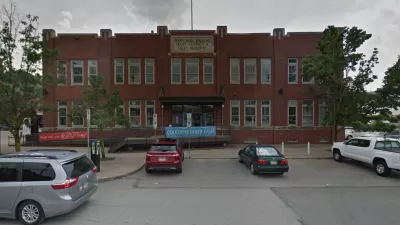The Pittsburgh Post-Gazette recently published an investigation of the city's efforts to buy and rehabilitate vacant properties in the troubled neighborhood of Homewood.

Ashley Murray and Joel Jacobs provide in-depth reporting on the city of Pittsburgh's efforts to revitalize the area of the city known as Homewood, "long plagued by blight and crime."
The city has spent $3.6 million buying vacant properties in treasurer's sales over unpaid taxes, "but dozens of the homes remain eyesores and, in some cases, the target of code violations by the city’s own inspectors," according to the article.
"The Pittsburgh Post-Gazette examined the records of 133 buildings owned by the city — including houses and storefronts — and found inspectors slapped violations on nearly 60% of them, including homes that were not only unfit for human habitation, but could place people in imminent danger," reports Murray and Jacobs.
While property owners can be punished for code violations, the city is not subject to the same enforcement.
The program of acquiring and improving vacant and blighted structures is taking on new importance as community groups have been pushing for "one of the most ambitious plans in the neighborhood’s history to promote green space, affordable housing and a business corridor to help an area that has undergone dramatic changes."
The city's vacant properties program is intended to "pave the way for development and the potential for new homes, parks and stores" under a land bank run by the Urban Redevelopment Authority. "But so far, most of the properties have not been turned over to public agencies or private investors since the city ramped up acquisitions a decade ago."
The source article includes infographics, more data, and specific examples of blight among the properties acquired by the city.

Planetizen Federal Action Tracker
A weekly monitor of how Trump’s orders and actions are impacting planners and planning in America.

Restaurant Patios Were a Pandemic Win — Why Were They so Hard to Keep?
Social distancing requirements and changes in travel patterns prompted cities to pilot new uses for street and sidewalk space. Then it got complicated.

Map: Where Senate Republicans Want to Sell Your Public Lands
For public land advocates, the Senate Republicans’ proposal to sell millions of acres of public land in the West is “the biggest fight of their careers.”

Maui's Vacation Rental Debate Turns Ugly
Verbal attacks, misinformation campaigns and fistfights plague a high-stakes debate to convert thousands of vacation rentals into long-term housing.

San Francisco Suspends Traffic Calming Amidst Record Deaths
Citing “a challenging fiscal landscape,” the city will cease the program on the heels of 42 traffic deaths, including 24 pedestrians.

California Homeless Arrests, Citations Spike After Ruling
An investigation reveals that anti-homeless actions increased up to 500% after Grants Pass v. Johnson — even in cities claiming no policy change.
Urban Design for Planners 1: Software Tools
This six-course series explores essential urban design concepts using open source software and equips planners with the tools they need to participate fully in the urban design process.
Planning for Universal Design
Learn the tools for implementing Universal Design in planning regulations.
Heyer Gruel & Associates PA
JM Goldson LLC
Custer County Colorado
City of Camden Redevelopment Agency
City of Astoria
Transportation Research & Education Center (TREC) at Portland State University
Camden Redevelopment Agency
City of Claremont
Municipality of Princeton (NJ)




























